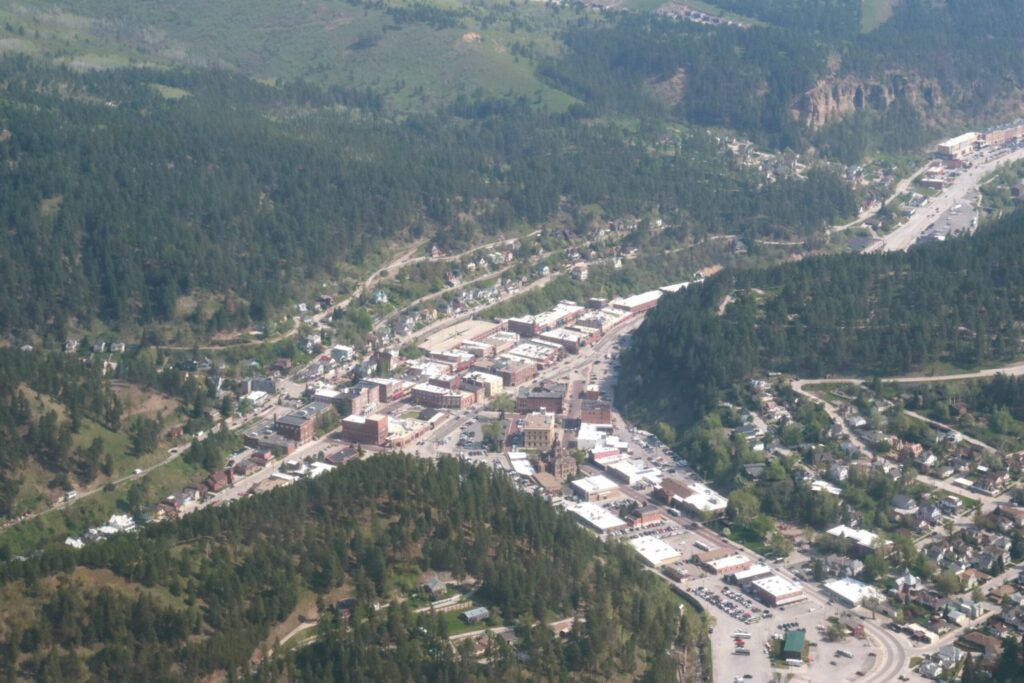
(John Hult/South Dakota Searchlight)
Teachers in Pine Ridge, service members at Ellsworth Air Force Base and thousands of Sioux Falls residents are among the beneficiaries of about $48 million in housing grants awarded Tuesday.
The South Dakota Housing Development Authority sent the money to 20 separate projects to help developers pay for infrastructure like streets, water and sewer lines.
The awards came from a $200 million pool of funds lawmakers passed in 2023 after more than a year of delays. Its swift passage was followed by months of rulemaking. September saw the first awards, with $10.3 million committed to seven separate projects in Box Elder, Pierre, Brookings, Aberdeen and Lake Preston.
The largest grant of the bunch on Tuesday went to the city of Sioux Falls, which asked for $14 million to help pay for a sewer basin on 3,100 acres of land. Chas Olson, the Housing Development Authority’s executive director, said the project is expected to open up the area to hundreds of homes, apartment complexes, duplexes or townhomes.
“The total land within the basin is projected to support development of approximately 2,600 single family units,” Olson said.
Alex Jensen, a newly appointed board member and current Sioux Falls City Council member, recused himself from the vote.
The Sioux Falls grant earned unanimous support from the board, as did the 19 other projects under consideration Tuesday. Just two sparked questions from the board.
The Oglala Lakota County School District’s application for teacher housing included a waiver request to make it eligible for about $600,000 more than it would be otherwise. The board approved, but had questions.
The reason for the waiver is tied to program rules and its funding sources, as well as to tribes’ status as sovereign entities, rather than political subdivisions of the state of South Dakota.
The $200 million pool is split in two. The larger portion, $150 million, is for any kind of infrastructure built by a developer and later handed off to a “political subdivision” of the state. Developer-built streets later maintained by a city, for example, are eligible.
The remaining $50 million is tied to a pool of federal money tagged specifically for water-related infrastructure. That money can cover a third of the cost of the water-related portions of a new development, but not for things like streets.
Unlike the $150 million funding source, however, tribes needn’t partner with a city, county or other government entity to get the money.
The school district asked the board to consider allowing it to fund a full third of the infrastructure in its teacher housing project through the $50 million pool of federal funding. Its $2.5 million grant request is about $600,000 higher than it would be eligible for without the waiver.
The district is building 15 homes and 32 duplexes for the teachers who now sometimes drive an hour both ways to work.
“… Without a new water source, Pine Ridge will be unable to meet their current and future housing needs, as well as the water needs of the high school, elementary school, and daycare facilities,” the application said.
Watertown’s Rick Hohn questioned the wisdom of a waiver so early on in the program’s life.
“So if we don’t approve the waiver, they don’t have another source of funding?” Hohn said.
Tobin Morris of Colliers Securities, speaking for the district, said debt is the only other source. The trouble is that reservation school districts don’t have access to the same kinds of financing that non-reservation districts do, Morris said, which would force the school to take from other programs to service the debt.
Morris noted that the housing and water tower project together will improve the entire community’s access to clean water. A new water source for Pine Ridge teachers will help relieve pressure on the Mni Wiconi Rural Water System, he said.
“It frees up that capacity to basically address water shortages that happen almost every summer from either the breakage or the lack of capacity,” Morris said.
The only other questions came on a project in Box Elder, a growing community near Ellsworth. The city was awarded three grants in September, and another application appeared at Tuesday’s meeting.
The impending arrival of the B-21 bomber to that site is expected to put pressure on the housing market, Olson told the board. A housing study for the Rapid City area pointed to a high need for housing for at least five years, “so at this time, we feel that we still have a need in that area.”
Housing infrastructure program awards, October
Oglala Lakota County School District Teacher Housing: Pine Ridge, $2.5 million
Apple Valley Subdivision: Rapid Valley, $5.9 million
City Springs – Vanocker Canyon: Sturgis, $2.1 million
Curtis Creek Subdivision: New Underwood, $1.6 million
Sewer Basin 15 Expansion: Sioux Falls, $14 million
The Summit at Deadwood Stage Run, LLC: $3.3 million
Elk Point Community Infrastructure Project: Elk Point, $1.2 million
Yankton Thrive Garden Estates: Yankton, $1.6 million
Yankton Thrive Manitou North: Yankton, $1.3 million
Kangas West Addition: Lake Norden, $327,240
Stardust Subdivision: Mitchell, $567,568
Kroetch Addition Development: Philip, $400,000
Pine Haven Estates: Aberdeen, $750,000
Red Feren Subdivision – Phase 3: Box Elder, $940,039
Smokey Groves Subdivision: Chamberlain, $1.5 million
South Lake Housing Development: Mitchell, $925,000
Harvest Meadows and ValleyView Subdivision: Sturgis, $2.4 million
The Highlands at Norman Ranch: Summerset, $3.2 million
Trojan Village: Madison, $1 million
Webster Development Shoemaker Addition: $2.6 million
